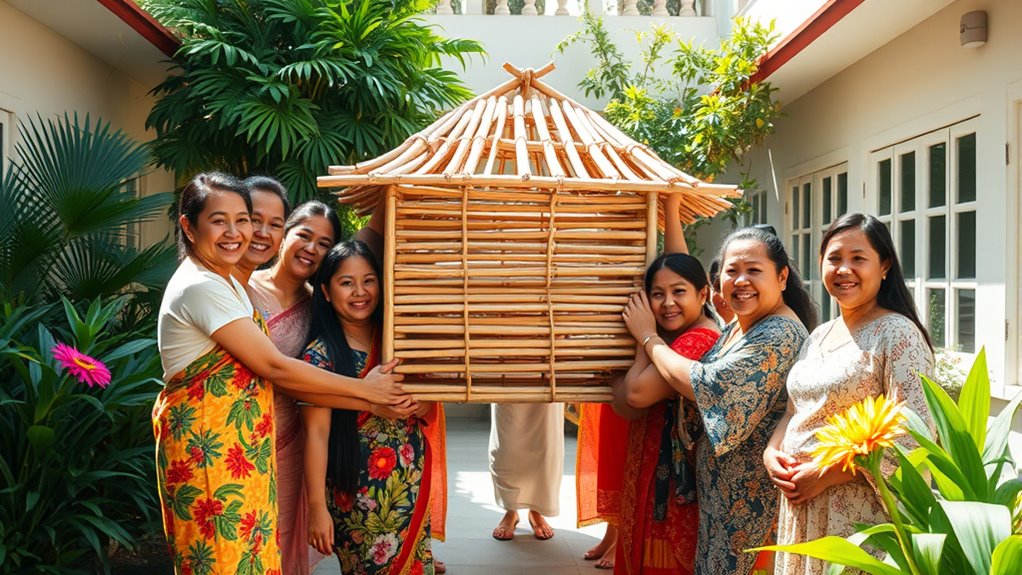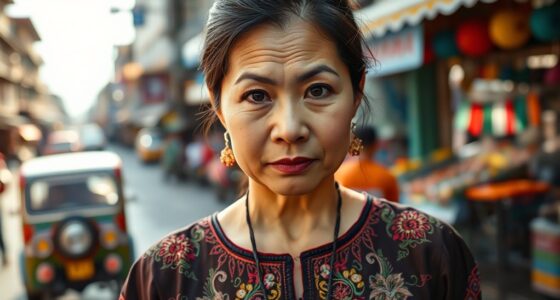Bayanihan plays a crucial role in strengthening Filipino family bonds. It fosters unity through collective efforts and mutual support, creating a culture of shared responsibilities among family members. You’ll see its impact during communal activities, especially in times of need. This spirit encourages altruism and empathy, reinforcing family ties. As families work together, they build resilience and face challenges more effectively. Discover how this cultural practice continues to shape family interactions across generations.
Key Takeaways
- Bayanihan fosters collective responsibility, strengthening family unity by prioritizing the group’s welfare over individual interests.
- The practice encourages resource sharing, allowing families to pool funds and support each other during financial challenges.
- Emotional and psychological well-being is enhanced as family members share burdens, providing mutual support in difficult times.
- Bayanihan reinforces core Filipino values like pakikisama and kapwa, promoting empathy and altruism within family relationships.
- The legacy of Bayanihan inspires younger generations to engage in community service, further enhancing family and communal bonds.
Understanding Bayanihan and Its Cultural Roots
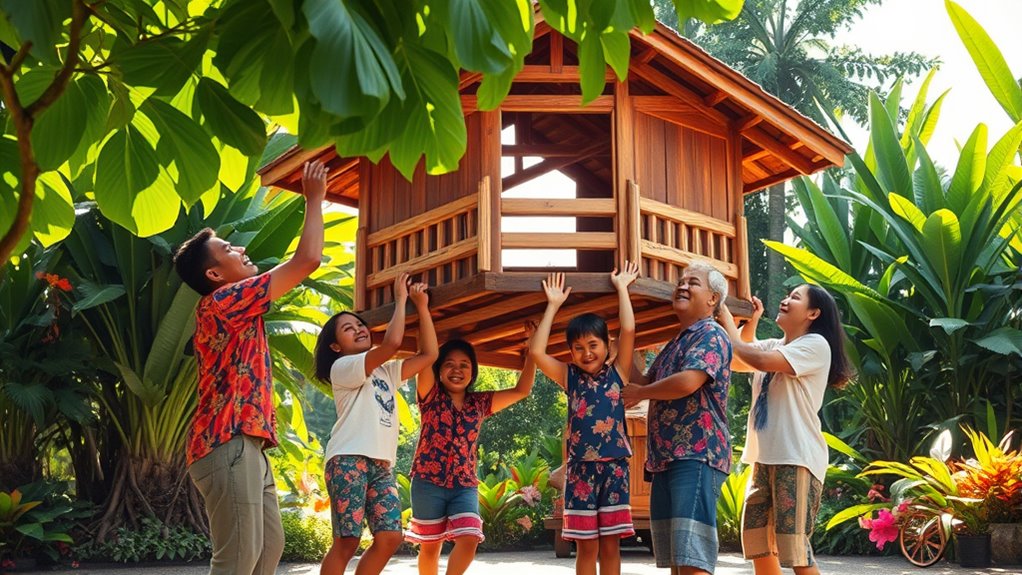
Bayanihan, a beautiful expression of Filipino culture, embodies the spirit of community and cooperation. It originates from the word *bayan*, meaning “town, nation, or community.”
Bayanihan reflects the heart of Filipino culture, highlighting community spirit and the power of cooperation.
This concept emphasizes mutual assistance, fostering unity, especially in times of need. You’ll often see bayanihan in action during communal activities, like helping families move traditional houses, showcasing the strength of community bonds. Bayanihan is traditionally depicted by communities moving a bahay kubo, reflecting core Filipino values, including togetherness and hospitality, reinforcing the idea of collective effort without expecting material rewards.
This centuries-old practice continues to influence how Filipinos interact, highlighting the importance of emotional and financial support.
Fundamentally, bayanihan creates a strong sense of solidarity and interconnectedness within Filipino society.
The Impact of Bayanihan on Family Unity
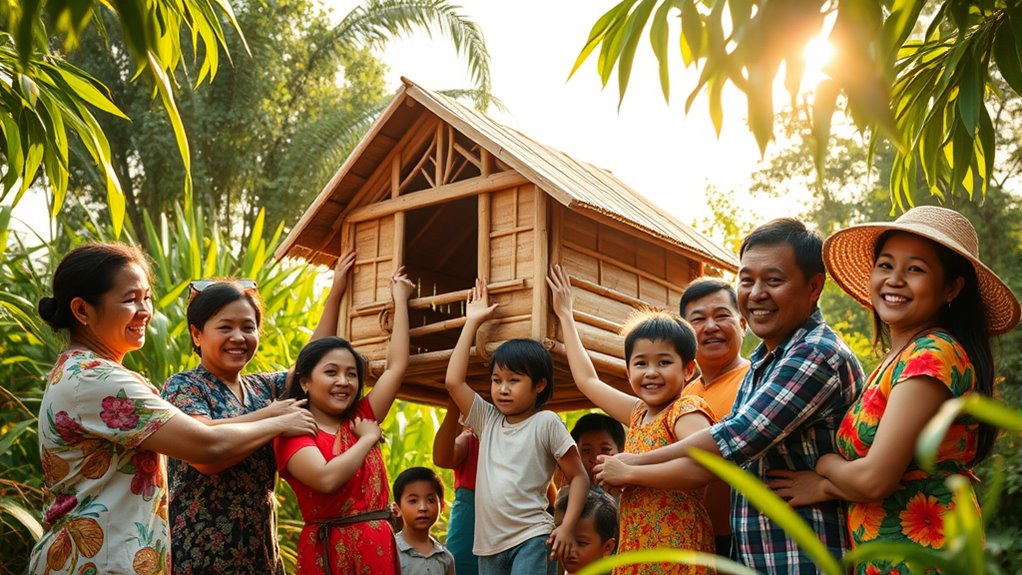
The spirit of bayanihan extends beyond community cooperation; it plays a significant role in strengthening family unity. By prioritizing group welfare, it fosters social harmony among families, highlighting the importance of collective responsibility.
When neighbors come together to help with tasks like relocation, it reinforces family bonds and illustrates the support available in times of need. Celebrations, such as festivals, create shared joy, further solidifying these connections.
Additionally, bayanihan encourages altruistic acts and empathy, enhancing emotional support among family members. Engaging in community efforts strengthens intergenerational relationships, as both young and old collaborate. This culture of mutual aid builds resilience, making families more resourceful when facing challenges together, ultimately deepening their unity. The values of pakikipagkapwa-tao embedded in bayanihan enhance the sense of belonging and support among family members.
Financial Support and Resource Sharing in Filipino Families
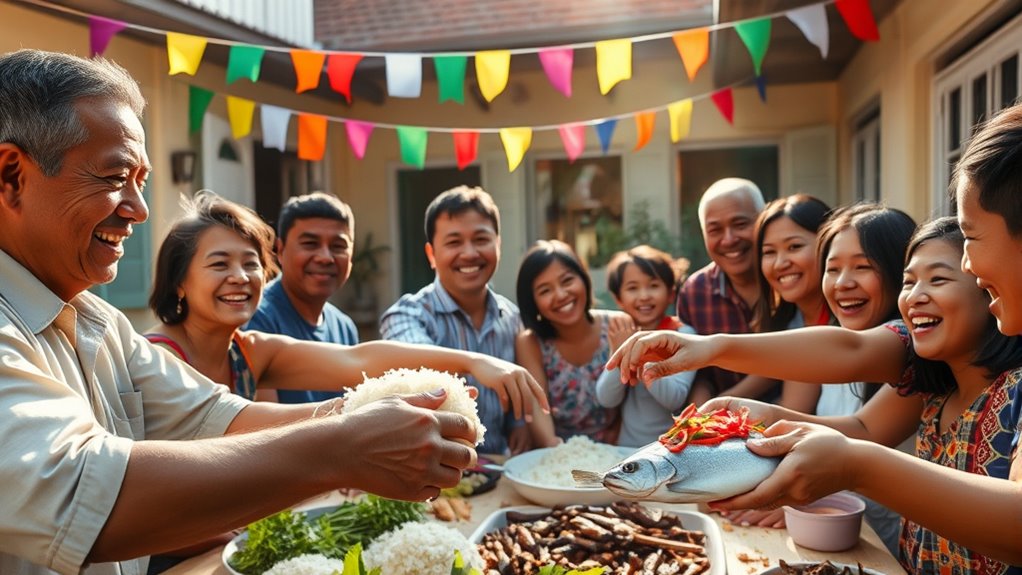
When financial challenges arise, Filipino families often turn to the bayanihan spirit, which fosters a culture of support and resource sharing.
You’ll find that community members come together, pooling their resources to provide mutual financial aid during tough times. This coordination typically happens through communal events, where families discuss needs and organize assistance.
Emergency funds are often established to tackle unexpected expenses, ensuring that families have a safety net.
Additionally, bayanihan promotes entrepreneurial support, offering microfinance opportunities and job training to enhance employability.
Emotional and Psychological Benefits of Bayanihan
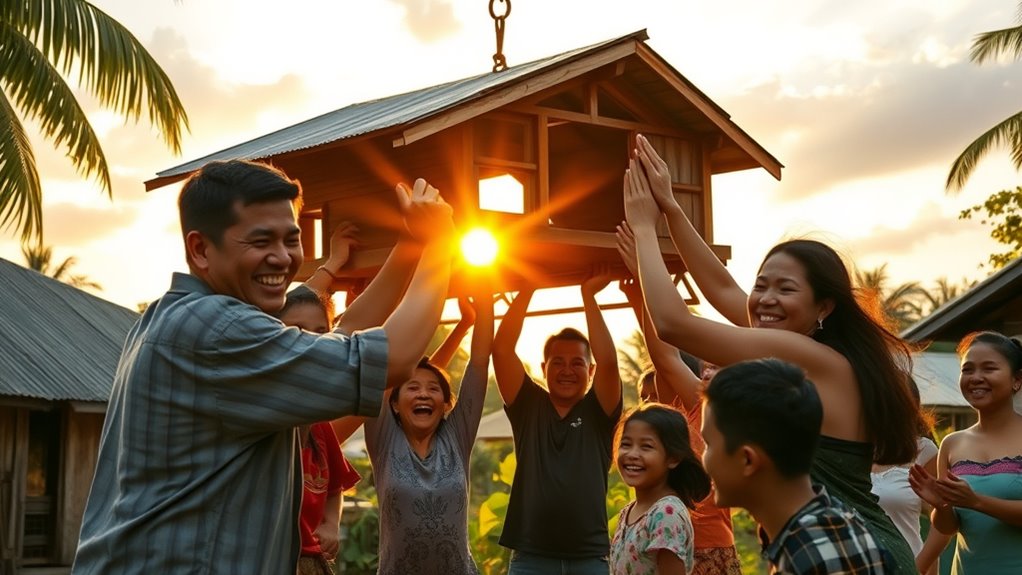
Financial support in Filipino families is just one facet of the bayanihan spirit; it also greatly enhances emotional and psychological well-being. When you engage in bayanihan, you foster community unity, which helps you cope with emotional difficulties through mutual support.
By sharing responsibilities, you lighten individual burdens and build resilience. This cultural practice emphasizes the importance of belonging, making you feel valued. While it promotes harmony, it can sometimes limit open emotional expression, so it’s important to strike a balance.
Strong familial ties and community involvement provide better access to mental health resources, allowing you to manage emotional challenges effectively. Ultimately, bayanihan reinforces a collective identity that strengthens both individual and community well-being.
Practical Applications of Bayanihan in Family Life
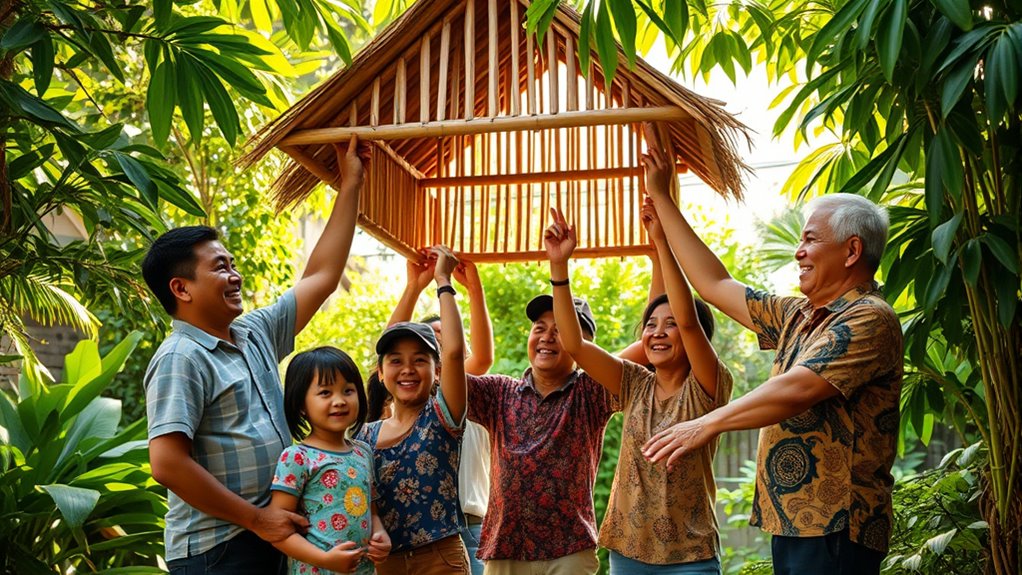
Embracing the bayanihan spirit in family life enriches everyday experiences through practical applications that strengthen bonds. You can actively participate by pooling resources with family members during emergencies or special events, ensuring everyone stays supported.
Sending remittances to loved ones back home helps with education and healthcare, emphasizing family welfare. Sharing daily tasks like childcare and household chores fosters teamwork, while skills such as cooking or repair work create a supportive environment.
Additionally, during family gatherings, everyone pitches in to make celebrations successful, reinforcing unity. By assisting each other during hardships and reciprocating support, you contribute to a cycle of mutual assistance that enhances your family’s resilience and adaptability in modern life. Moreover, establishing clear communication within the family ensures that everyone feels heard and valued, further strengthening these bonds.
The Legacy of Bayanihan Across Generations
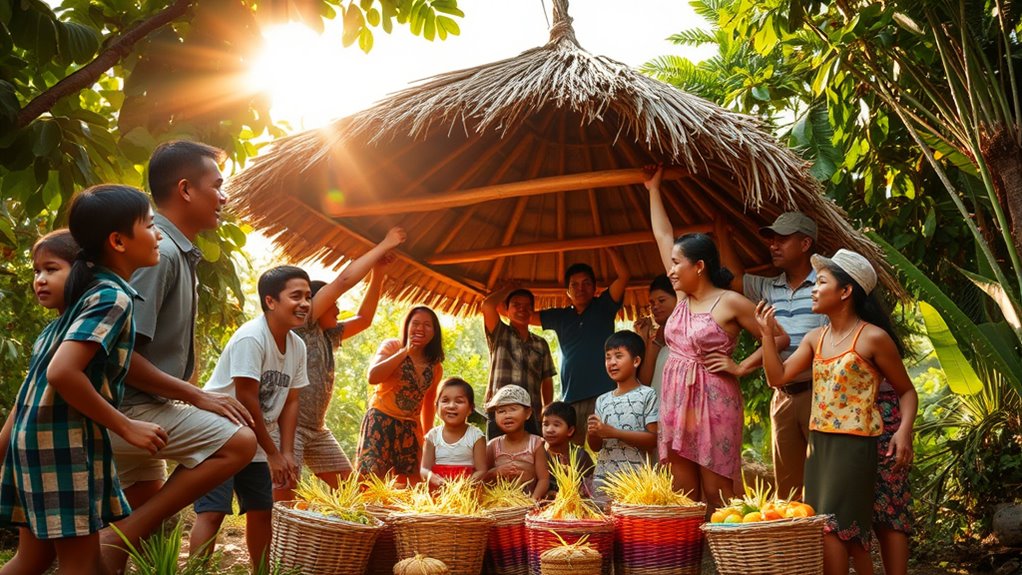
Bayanihan stands as a symbol of the enduring spirit of Filipino culture, illustrating how communal support has shaped family and community ties across generations. This ancient tradition, rooted in collective welfare, promotes unity and solidarity among families.
You’ll find that it embodies core Filipino values like pakikisama and kapwa, fostering a strong community spirit. As you engage in bayanihan activities, you not only contribute to social harmony but also reinforce resilience, especially during challenging times.
This legacy, passed down through generations, inspires youth to participate in community service and uphold altruism. By adapting to modern issues while retaining its essence, bayanihan continues to be a cultural icon that unites Filipinos and strengthens their bonds.
Frequently Asked Questions
How Can I Practice Bayanihan in My Daily Life?
You can practice bayanihan in your daily life by volunteering for local community projects, helping neighbors with tasks like moving or repairs, and offering emotional or financial support to family members in need.
Organize or participate in community events to foster unity, and consider starting mentorship programs to guide younger members.
What Are Modern Examples of Bayanihan in Urban Settings?
In modern urban settings, you can see bayanihan through community pantries where neighbors leave food for those in need.
After natural disasters, residents band together for cleanup and rebuilding efforts.
You’ll also find organized environmental cleanup days that bring people together to enhance shared spaces.
Additionally, pooling resources for community projects or supporting local businesses showcases how collective action strengthens bonds, creating a supportive and resilient neighborhood.
How Does Bayanihan Influence Filipino Diaspora Communities?
Did you know that over $33 billion in remittances was sent by Filipinos abroad in 2020? This financial support showcases how bayanihan influences Filipino diaspora communities, promoting collective welfare.
You actively participate in cultural events and grassroots initiatives, reinforcing your connection to home. By pooling resources and sharing responsibilities, you help address common challenges, creating a supportive network that embodies the spirit of bayanihan, enhancing both community ties and cultural identity.
Are There Any Bayanihan-Inspired Organizations or Initiatives?
Yes, there are several bayanihan-inspired organizations and initiatives. You can explore Pure Bayanihan, which focuses on creating sustainable livelihoods to combat poverty.
The Bayanihan Council promotes cultural pride and unity among Filipinos worldwide through various events.
Additionally, the CA2RE Project researches community-driven design, emphasizing bayanihan’s role.
These initiatives not only uplift communities but also foster collaboration and support, highlighting the enduring spirit of bayanihan in various contexts.
What Challenges Does Bayanihan Face in Contemporary Society?
Bayanihan faces several challenges in contemporary society. You might notice that urbanization promotes individualism, making it harder to foster communal values.
Technological advances can reduce face-to-face interactions, weakening community ties. Economic pressures often shift your focus from collective well-being to personal survival.
Additionally, cultural shifts and the rise of selfish attitudes can further erode the spirit of bayanihan, making it essential to adapt and innovate to sustain these important community practices.
Conclusion
So, next time you’re juggling your cousin’s wedding, your brother’s business launch, and your aunt’s birthday party all in one weekend, just remember: that’s bayanihan at its finest! Who needs personal space when you’ve got an army of relatives ready to lend a hand—or their opinions? Embrace the chaos, because nothing says “family unity” like a potluck where everyone brings a dish they can’t pronounce. After all, isn’t that what family is all about?
